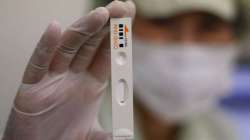COVID-19 patients with high stress hormone levels at greater death risk: Lancet study
COVID-19 patients with extremely high levels of the stress hormone cortisol in their blood are more likely to deteriorate quickly and die, according to study led by an Indian origin researcher in the UK.

COVID-19 patients with extremely high levels of the stress hormone cortisol in their blood are more likely to deteriorate quickly and die, according to study led by an Indian origin researcher in the UK. The study, published in The Lancet Diabetes & Endocrinology on Thursday, provides the first data to show that cortisol levels are a marker of the severity of the illness.
The researchers, led by Professor Waljit Dhillo from Imperial College London in the UK, suggest they can be used to identify those patients who are more likely to need intensive cover.
Cortisol is produced by the body in response to stress such as illness, triggering changes in metabolism, heart function and the immune system to help our bodies cope, the researchers said.
Our cortisol levels when healthy and resting are 100-200 nm/L and nearly zero when we sleep.
When ill patients have low levels of cortisol, it can be life threatening, they said.
According to the researchers, excessive levels of cortisol during illness can be equally dangerous, leading to increased risk of infection and poor outcomes.
In the new observational study of 535 patients, of whom 403 were confirmed to have COVID-19, cortisol levels in patients with COVID-19 were significantly higher than in those without.
The levels in the COVID-19 group ranged as high as 3241 --considerably higher even than after major surgery, when levels can top 1000, the researchers said.
Amongst the COVID-19 patients, those with a baseline cortisol level of 744 or less survived on average for 36 days.
Patients with levels over 744 had an average survival of just 15 days.
"From an endocrinologist's perspective, it makes sense that those COVID-19 patients who are the sickest will have higher levels of cortisol, but these levels are worryingly high," said Dhillo, Head of Division of Diabetes, Endocrinology and Metabolism at Imperial College London.
"Having an early indicator of which patients may deteriorate more quickly will help us with providing the best level of care as quickly as possible, as well as helping manage the pressure on the NHS," he said.
In addition, he said medical professionals can also take cortisol levels into account when we are working out how best to treat our patients.
In the study, COVID-19 swab test and routine blood tests -- including a baseline measurement of cortisol levels -- were performed within 48 hours of admission.
Over the study period, just under 27 per cent of the COVID-19 group died during the study period compared to just under 7 per cent of the non-COVID-19 group, the researchers said.